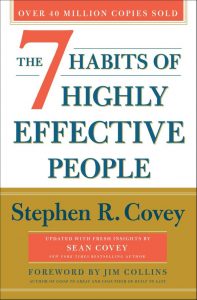The 7 Habits of Highly Effective People, by Stephen Covey
Publisher: Simon & Schuster (1989)
ISBN-13: 978-0743269513
Buy: The 7 Habits of Highly Effective People at Amazon
Rating: ⭐⭐⭐⭐⭐
Table of Contents
Habit 1: Be Proactive
from The 7 Habits of Highly Effective People by Stephen Covey (1989)
3 Main Ideas
- Human beings possess the gift of self-awareness, which allows us to examine and think about ourselves. We do not behave on mere impulse, as a pure function of inputs and outputs. Between stimulus and response, we have the freedom to choose.
- We are responsible for our own lives. Our behavior is the result of our decisions, our actions, our choices, and not our conditions. Proactive people are driven by values, and are able to subordinate feelings to values. Reactive people are driven by feelings, by circumstances, by conditions, by their environment. Reactive people have chosen to be controlled by emotions, circumstances, or by other people.
- Anytime we think the problem is “out there,” that thought is the problem. We empower what’s out there to control us. The change paradigm is “outside-in”—what’s out there has to change before we can change. (103)
5 Key Takeaways
- We are in charge of our lives, and we choose the scripts by which we live our lives. Our basic nature is to act, and not be acted upon. pg. 89
- Initiative means recognizing our responsibility to make things happen. It’s not waiting around to be told what to do. In order to be effective, one must be proactive. It requires taking it upon oneself to be responsible for initiating change and solving problems.
- It is so much easier to blame other people, conditioning, or conditions for our own stagnant situation. It’s easier to wait for others to help. But we are responsible to control our lives and to powerfully influence our circumstances by working on ourselves, on what we are.
- The proactive approach is to change from the inside out: to be different, and by being different, to effect positive change in what’s out there. (103)
- Being proactive comes down to two things:
- Take responsibility for your life
- Take initiative. Don’t wait for life to happen to you; happen to it. Be an agent, not a victim. Be the driver of your life, not just a passenger. (116)
3 Top Quotes
- Between stimulus and response, man has the freedom to choose. (83)
- Proactivity means more than merely taking initiative. It means that as human beings, we are responsible for our own lives. Our behavior is a function of our decisions, not our conditions. We can subordinate feelings to values. We have the initiative and the responsibility to make things happen. (84)
- Anytime we think the problem is “out there,” that thought is the problem. We empower what’s out there to control us. The change paradigm is “outside-in”—what’s out there has to change before we can change. (103)
Summary
Part Two of 7 Habits of Highly Effective People examines the Private Victories that comprise Habits 1 through 3. A summary of the overall book and all the seven habits can be found here.
Habit 1 is the foundational basis for all the other six habits. It requires us to accept responsibility and to take charge of our lives. We aren’t victims of circumstances; we are self-aware human beings who have the freedom to choose our response to what happens to us.
Being proactive means focusing on what you can control, what Dr. Covey terms your “circle of influence”. I find this very similar to the teachings of Marcus Aurelius in “Meditations”. Habit 1 has a lot in common with Stoic philosophy.
Writing over 2,000 years before Dr. Covey, Marcus Aurelius, Emperor of the Roman Empire, advises:
“Don’t waste the rest of your time here worrying about other people—unless it affects the common good. It will keep you from doing anything useful. You’ll be too preoccupied with what so-and-so is doing, and why, and what they’re saying, and what they’re thinking, and what they’re up to, and all the other things that throw you off and keep you from focusing on your own mind.”
This is basically what Dr. Covey advises us to do in focusing on our circle of influence, and to not be distracted by other people, emotions, or circumstances. It’s the same advice.
And when Marcus Aurelius counsels:
“It doesn’t hurt me unless I interpret its happening as harmful to me. I can choose not to.”
Or
“External things are not the problem. It’s your assessment of them. Which you can erase right now.”
It’s like hearing Dr. Covey’s voice when he says, “It is our willing permission, our consent to what happens to us, that hurts us far more than what happens to us in the first place.” (85)
And these words from Marcus Aurelius are nothing other than a call for responsibility and proactivity:
“The mind adapts and converts to its own purposes the obstacle to our acting. The impediment to action advances action. What stands in the way becomes the way.”
or
“But if you accept the obstacle and work with what you’re given, an alternative will present itself – another piece of what you’re trying to assemble. Action by action.”
By working on ourselves instead of worrying about conditions, we are able to influence the conditions. Any time we think the problem is “out-there,” that thought is itself the problem.
Habit 1: Be Proactive
- The current social paradigm tells us we are largely determined by conditioning and conditions. The basic idea is that we are conditioned (by genetics, our upbringing, or our environment) to respond in a particular way to a particular stimulus.
- While conditioning plays a powerful role in our lives, we do have the ability to control its influence.
- Between stimulus and response, man has the freedom to choose. (83)
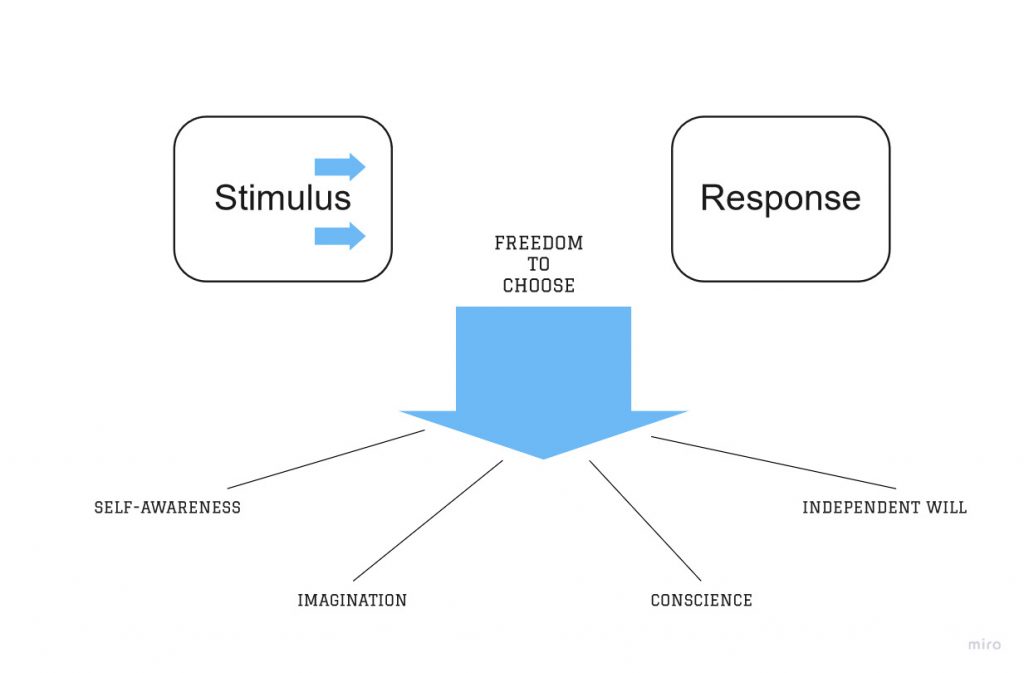
- People possess:
- Self-awareness: the ability to stand apart from ourselves and observe what we like or don’t like about our current realities
- imagination—the ability to envision new possibilities.
- conscience—a deep inner awareness of right and wrong, of the principles that govern our behavior, and a sense of the degree to which our thoughts and actions are in harmony with them.
- independent will—the ability to act based on our self-awareness, free of all other influences. (83)
- Self-awareness is the catalyst for the other three endowments. When you can stand apart from your own mind and examine it—to think about your thoughts, feelings, and moods—you then have the basis for using imagination, conscience, and independent will in entirely new ways. (115)
- For instance, if someone were to slap you, you would have a variety of options. You can choose how to respond. You could choose to slap the person back, you could choose to cry, you could choose to walk away, you could choose to ask why. Between the stimulus of the slap, you are free to choose your response based on your own unique human endowments. You’re not a slave to your impulses.
- Because of these unique human endowments, we can write new programs for ourselves totally apart from our instincts and training. (83)
- Between stimulus and response is our greatest power – the freedom to choose. (84)
Example: Viktor Frankl
- Viktor Frankl was a Jewish Austrian psychiatrist who was imprisoned in four different Nazi concentration camps during WW2, including Auschwitz.
- For several years, he was subjected to imprisonment, torture, starvation, forced labor, and other horrors. Death was always around the corner.
- His parents, his brother, and his wife died in the camps or were sent to the gas ovens. Except for him and his sister, his entire family perished.
- One day, naked and alone in a small room, Frankl become aware of what he called “the last of the human freedoms”—the freedom his Nazi captors could not take away.
- The Nazis could control his entire environment, they could do what they wanted to his body, but he himself was a self-aware being who could look as an observer at his very involvement.
- His basic identity was intact. He could decide within himself how all of this was going to affect him. Between what happened to him, or the stimulus, and his response to it, was his freedom or power to choose that response.
- Frankl chose to find meaning in his suffering; to help other prisoners in the concentration camp; to envision his future after liberation; to find meaning in his relationship with his wife (he was unaware of her death).
- In the midst of the most degrading circumstances imaginable, Frankl used the human endowment of self-awareness to discover a fundamental principle about the nature of man: Between stimulus and response, man has the freedom to choose. (83)
Proactivity
- Proactivity means more than merely taking initiative. It means that as human beings, we are responsible for our own lives. Our behavior is a function of our decisions, not our conditions. We can subordinate feelings to values. We have the initiative and the responsibility to make things happen. (84)
Proactive People
- Proactive people recognize the responsibility to choose their own response. They do not blame circumstances, conditions, or conditioning for their behavior. Their behavior is a product of their own conscious choice, based on values, rather than a product of their conditions, based on feeling. (84)
- Proactive people are driven by values—carefully thought about, selected, and internalized values. (85)
- If their value is to produce good quality work, it isn’t a function of whether the (physical or emotional) weather is conducive to it or not.
- Proactive people subordinate feelings to values. The ability to subordinate an impulse to a value is the essence of the proactive person.
- Proactive people make choices based on values. They think before they act. They recognize they cannot control everything that happens to them, but they can control what they do about it. (116)
- Being proactive comes down to two things:
- Take responsibility for your life
- Take initiative. Be an agent, not a victim. Don’t wait for life to happen to you; happen to it. Be the driver of your life, not just a passenger. pg. 116
Reactive People
- Reactive people are driven by feelings, by circumstances, by conditions, by their environment. They build their emotional lives around the behavior of others, empowering the weaknesses of other people to control them. pg. 85
- Reactive people wait for others to help them. They don’t use their R and I (resourcefulness and initiative).
- Reactive people are often affected by their physical and social environment. If the weather is good, they feel good. If it isn’t, it affects their attitude and their performance. When people treat them well, they feel well; when people don’t, they become defensive or protective.
Choice
- It’s not what happens to us, but our response to what happens to us that hurts us. It is our willing permission, our consent to what happens to us, that hurts us far more than what happens to us in the first place. (85) We can be physically, mentally, emotionally, or financially hurt. But our character, our basic identity, does not have to be hurt at all. (87)
- Eleanor Roosevelt: “No one can hurt you without your consent.”
- Gandhi: “They cannot take away our self-respect if we do not give it to them.”
- In fact, it is the things that hurt us the most that can provide us with inner strength and resilience, and help us to develop our character. Our most difficult experiences can give us the freedom to handle difficult circumstances in the future, and to serve as an inspiration for others to emulate.
- Viktor Frankl suggests that there are three central values in life:
- experiential: what happens to us
- creative: what we make or create
- attitudinal: our response in difficult circumstances, eg. terminal illness.
- The highest of the three values is attitudinal, in the paradigm or reframing sense. What matters most is how we respond to what we experience in life.
Act or Be Acted Upon
- Despite our varying degrees of proactivity, our basic human nature or instinct is to act, and not be acted upon. (89)
- Many people wait for something to happen or someone to take care of them. But people who end up with the good jobs are the proactive ones who are solutions to problems, not problems themselves, who seize the initiative to do whatever is necessary, consistent with correct principles, to get the job done. (89)
- Proactive people recognize they have responsibility.
- Responsibility = “Response-ability”: the ability to choose how you will respond to a given stimulus or situation
- Being proactive means that you recognize your responsibility to make things happen. You always have the freedom to choose your attitude and your response, or to do something to change your current situation.
- If you refuse to act, if you choose to simply go with the flow, with the crowd, without a goal or direction, your life will be aimless and purposeless. Other people will be free to impose their will upon you.
- Each of the 7 habits requires you to be proactive and to take the initiative. Each puts the responsibility on you to act. If you wait to be acted upon, you will be acted upon. And growth and opportunity consequences attend either road. (90)
Listening to Our Language
- Language provides a frame for proactive and reactive thinking. It helps us determine the degree to which we see ourselves as proactive or reactive people.
- Reactive people use language that absolves them of responsibility:
- “That’s me”.
- “That’s just the way I am.”
- “There’s nothing I can do about it”.
- I don’t have the time
- If only
- I’m not responsible
- I can’t do it
- I have to do it
- That attitude comes from a basic paradigm of determinism; they are determined by external forces, and are unable to choose their response. pg. 94
- This determinism can become a self-fulfilling prophecy:
- People believe they are determined, and they produce evidence to support the belief.
- They feel increasingly victimized and out of control, not in charge of their life or their destiny.
- They blame outside forces—other people, circumstances, even the stars—for their own situation. pg. 95
- Proactive people use language that accepts responsibility:
- I will
- I can
- I choose
- I will fix this
- I will make the time
Circle Of Concern/Circle Of Influence
- To gauge your degree of proactivity, look at where you focus your time and energy.
- We all have things that directly concern us. However, there are some things over which we have no real control and others that we can do something about.
- Things we can influence – our health, our children, our work, etc.
- Things we can’t control – the national debt, the weather, traffic, nuclear war, etc
- Things we are concerned about, but cannot directly control go within a “Circle of Concern.”
- There is a smaller bucket of concerns that we are able to influence that is circumscribed within a smaller “Circle of Influence”. The Circle of Influence is a subset of the Circle of Concern
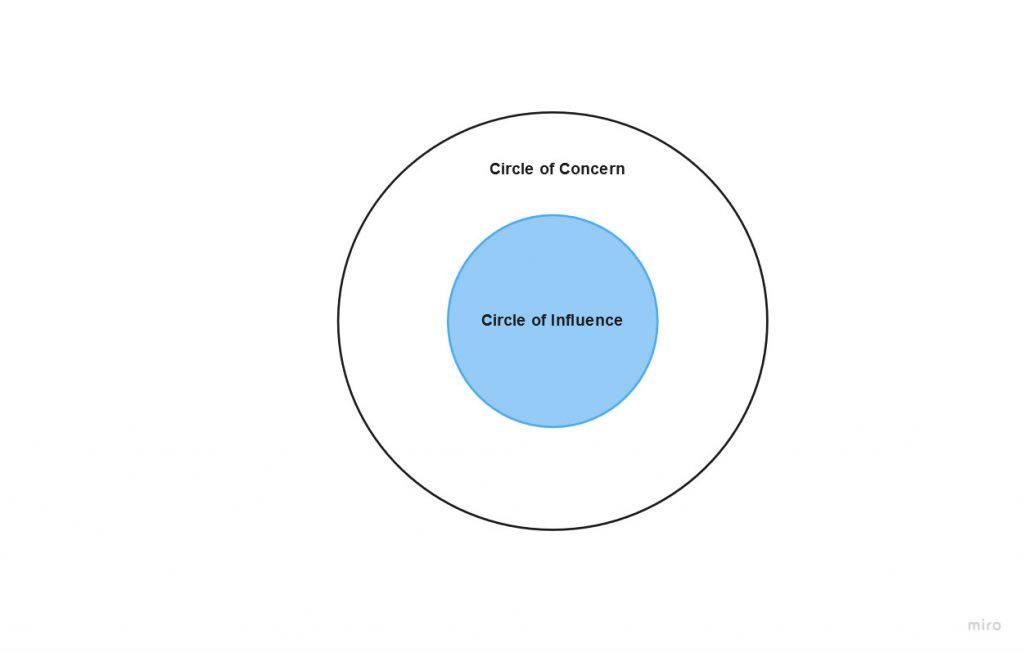
- Proactive people focus their efforts in the Circle of Influence. They work on the things they can do something about. The nature of their energy is positive, enlarging and magnifying, causing their Circle of Influence to increase. pg. 97
- As their Circle of Influence increases, they’re eventually able to change their circumstances.
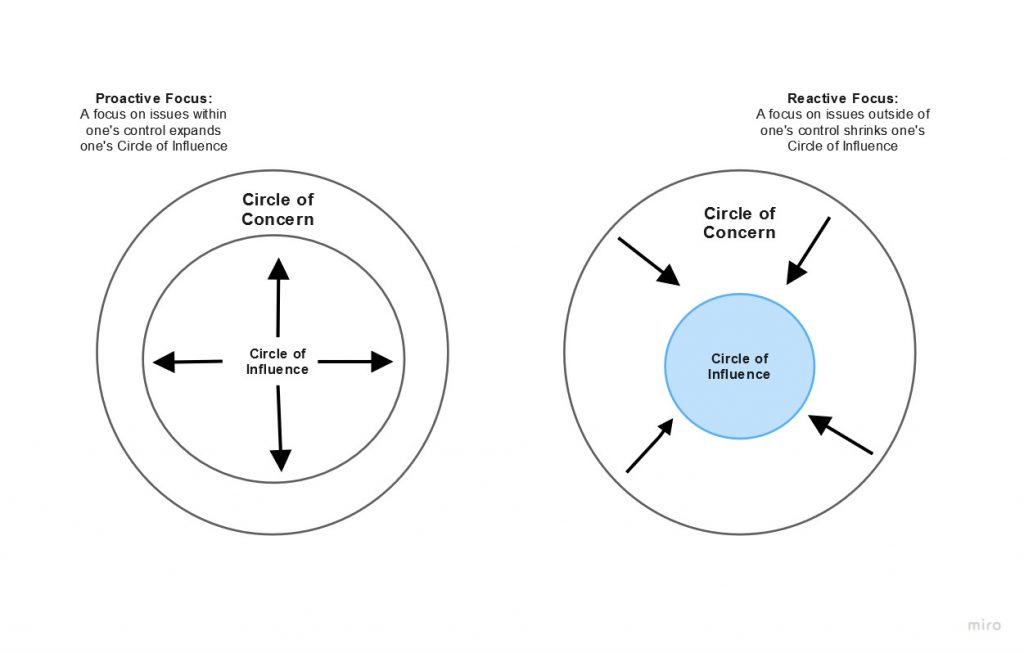
- Reactive people focus their efforts in the Circle of Concern. They focus on the weakness of other people, the problems in the environment, and circumstances over which they have no control.
- Reactive people waste their time and energy on concerns that are outside of their control. Their focus results in blaming and accusing attitudes, reactive language, and increased feelings of victimization.
- The negative energy generated by that focus, combined with neglect in areas they could do something about, causes their Circle of Influence to shrink. pg. 97
- Focusing on issues within our Circle of Concern wastes our time and energy on things we cannot control. We empower the things within it to control us. Even worse, it distracts us from taking the proactive initiative on the things we can actually influence in order to effect positive change.
- Rather than wasting time watching cable television, or worrying about other people at work, or the state of the federal government, etc, we could spend that time reading a book related to our job, taking classes and additional training, working on our health and fitness, spending time with our children, etc. That would be a more productive use of our limited time than worrying over things we cannot control.
- By working on ourselves instead of worrying about conditions, we were able to influence the conditions. (98)
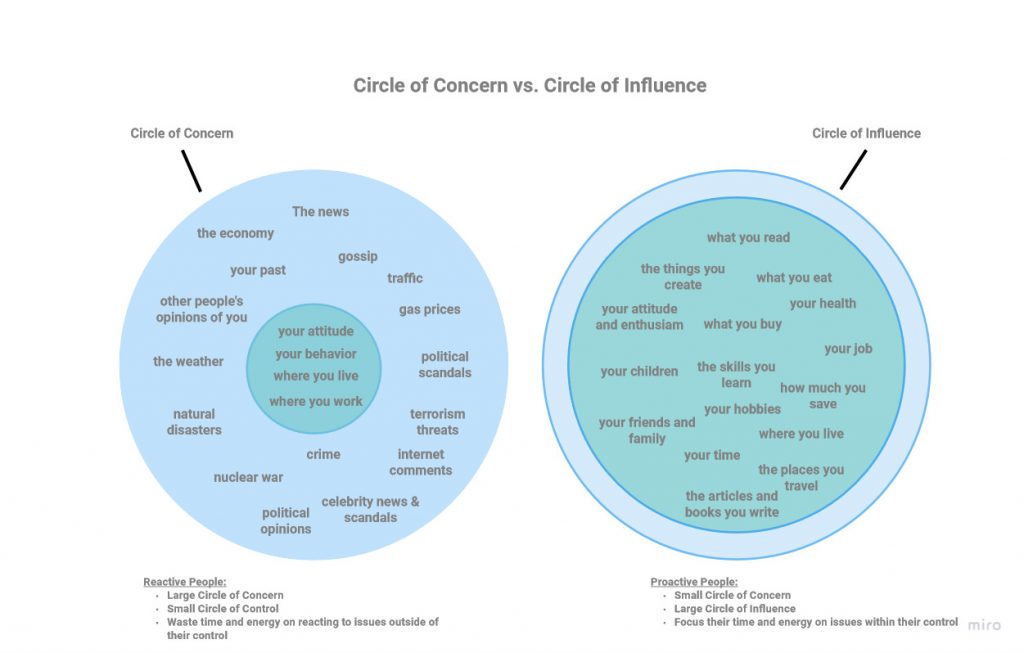
Direct, Indirect, And No Control
- Our problems fall into one of 3 areas:
- Direct control (problems involving our own behavior)
- Direct control problems are solved by working on our habits. They are obviously within our Circle of Influence.
- These are the “Private Victories” of Habits 1, 2, and 3.
- Indirect control (problems involving other people’s behavior)
- Indirect control problems are solved by changing our methods of influence.
- These are the “Public Victories” of Habits 4, 5, and 6.
- No control (problems we can do nothing about, such as our past or situational realities)
- No control problems involve taking the responsibility to genuinely and peacefully accept these problems and learn to live with them, even though we don’t like them.
- In this way, we do not empower these problems to control us.
- Changing our habits, changing our methods of influence, and changing the way we see our no-control problems are all within our Circle of Influence. (99)
Actions and Consequences
- While we are free to choose our actions, we are not free to choose the consequences of those actions. Consequences are governed by natural law. They are out in the Circle of Concern. pg. 105
- We are free to choose our response in any situation, but in doing so, we choose the attendant consequence.
- Past mistakes are also out there in the Circle of Concern. We can’t recall them, we can’t undo them, we can’t control the consequences that came as a result. We cannot undo the past, nor directly control its consequences.
- The proactive approach to a mistake is to acknowledge it instantly, correct, and learn from it. This literally turns a failure into a success. (106)
- We can choose to accept our mistakes or our past, learn and grow from them.
- Live out of your imagination, not your past. (116)
Making and Keeping Commitments
- At the very heart of our Circle of Influence is our ability to make and keep commitments and promises. The commitments we make to ourselves and to others, and our integrity to those commitments, are the essence and clearest manifestation of our proactivity. pg. 106
- Two ways to put ourselves in control of our lives immediately.
- We can make a promise—and keep it.
- Or we can set a goal—and work to achieve it.
- The power to make and keep commitments to ourselves is the essence of developing the basic habits of effectiveness. Knowledge, skill, and desire are all within our control. We can work on any one to improve the balance of the three. pg. 107
Live Proactively
- We need to exercise our proactive muscles daily, and during ordinary day-to-day events. It develops our proactive capacity to handle extraordinary situations, such as in life or death situations.
- People who exercise their embryonic freedom day after day will, little by little, expand that freedom. People who do not will find that it withers until they are literally “being lived.” They are acting out the scripts written by parents, associates, and society. (108)
- We are responsible for our own effectiveness, for our own happiness, and ultimately…for most of our circumstances. (108)
How to be more Proactive
- List out your Circle of Influence and your Circles of Concern.
- Make a plan to work on your circle of influence
- Watch less television, especially cable news.
- Use proactive language
- Observe how often you hear or use reactive phrases such as “I can’t”, “I have to”, “I don’t have time”, etc
- Start replacing reactive language with proactive language:
- Reactive Language: “I don’t have time”
- Proactive Language: “What can I do to make time?”
- Have a bias for action
Recommended Reading
You may also enjoy the following books:
- Meditations by Marcus Aurelius
- Man’s Search for Meaning by Viktor Frankl
Read the whole series
Overview: 7 Habits of Highly Effective People
Habit 1: Be Proactive
Habit 2: Begin With the End in Mind
Habit 3: Put First Things First
Habit 4: Think Win/Win
Habit 5: Seek First to Understand, Then to Be Understood
Habit 6: Synergize
Habit 7: Sharpen the Saw
Have you read this book? What did you think? Share your thoughts and ideas with me!
If you found this summary helpful, just click here to share it!
